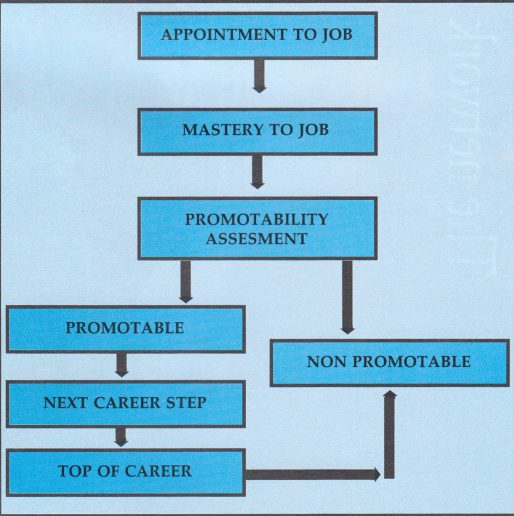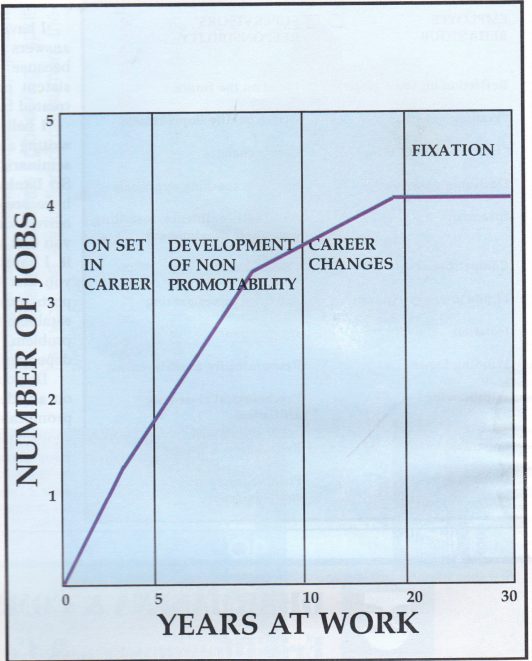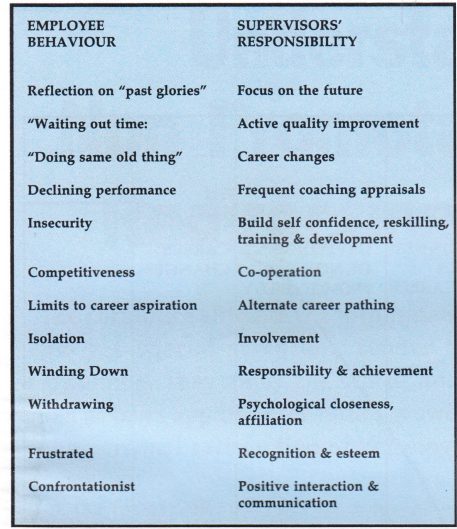The corporate elite are the ‘promotable’. These upward mobile people get special attention, tender loving care and management grooming. They enjoy the status and rewards of having been chosen as heirs apparent for future growth. Most importantly, they have the personal satisfaction of knowing they are going places.
THE CERTAINITY OF NON PROMOTABILITY More numerous and far less satisfied are the ‘non promotables’. They are usually identified as ‘low potential’ and ‘low performing” people. The ‘non promotables’ become depersonalized members of a growing army of second class citizens within the Company. Management expects less from them and gives them less.
Among the multinational and blue chip sectors in the gulf, who strive to achieve ‘equal opportunities employer’ status, ‘non promotables’ are a major problem, due to little or no natural attrition, as they outlive their usefulness to the organization. In Sri Lanka too with our very employee favored labor laws which do not permit termination due to low performance, this could be a major problem if critical assessments are not executed at recruitment time.
Competition for promotion is fierce. Everyone yearns for increasing rewards and unlimited promotional opportunities. And with the winners getting all, who wants to lose?
Yet, almost all become ‘Non promotable’. It’s just a matter of time, as the following diagram explains.
Once you have been in a job long enough to master it, your supervisor assesses your promotability. If you get a favorable rat

ing, you start moving up the career ladder with training and development, as openings occur until you reach ‘the top of your career’. Eventually you too become ‘non promotable’.
Dead-ended people may escape temporarily to other companies, where they resume their upward mobility until the next career impasse. When that happens, their work commitment, energy level and productivity tend to decline.
Thus ‘non promotability’ has a major impact not only on the individual, but on managers who supervise ‘non promotables’ as well as the companies which accumulate a growing number of them each year.
CARING FOR THE NON PROMOTABLES
Supervisors can help the ‘non promotables’ look forward to the future, develop themselves and experience a sense of fulfillment. It is possible for the supervisors to offset low financial rewards and lack of opportunity for career growth with equally satisfying psychological rewards. Stale people and stale jobs can be revitalized and a motivating work environment for the ‘non promotables’ can be created. Since most people fall in to that category eventually, the ‘non promotables’ deserve as much attention and management interest as the ‘promotables.”
PROCESS OF BECOMING NON PROMOTABLE
Because of the stigma attached to being ‘non promotable’, super- visors don’t want to speak with their direct reports or lack the courage to do so (this is common among Asian cultures).
Also the employees don’t want to listen to any suggestions that ‘non promotability’ is happening to them.
The process of ‘non promotability’ has three distinct phases ONSET, DEVELOPMENT, FIXATION, as shown above.
During the onset stage, you

come to recognise your place within the pecking order. You begin to ask yourself questions to compare yourself with the other people who are competing for advancement.
As a career matures, the pos sibility that one will not advance usually develops rapidly during years five to ten of your work life. In this stage, job switching is common, with people on the average holding from two to four different jobs.
The fixation stage of the ‘non promotability’ process is usually time related. On the average it occurs after at least the third job. By the time this stage is reached one becomes aware that his or her future aspirations probably will never be attained. People whose careers are in the fixation stage are in their mid thirties, forties and fifties and the final pre retirement years. Their energy has waned and their competitiveness and aggressiveness have probably been replaced by bitterness and just plain indifference.
PLAN FOR REDIRECTION
Everything seems to be working against the individual stuck in the fixations stage of his/her career. At this time supervisors become disenchanted with performance of ‘non promotables’ as the employee is with his/her career. It is important for supervisors to develop a plan to redirect careers of ‘non promotable’ employees. Below are areas which could be included in a comprehensive redirection plan for ‘non promotables.”

A FINAL MESSAGE
I haven’t tried in this article to supply final answers to the problem of ‘non promotability’ because I don’t have any. It is a globally persistent problem, that in my opinion can be treated but not cured.
I believe I have helped focus attention by writing about an area where public discussions, seminars and workshops have not been held in Sri Lanka. Hopefully some of the concepts I have presented (thanks to the education I received with Citibank in the Gulf) will convince you that something positive can be done about it. I have been successful, if I have convinced you that both supervisors and their direct reports must be willing to co-operate in order to establish favorable conditions to deal with the problem. The ideal relationship is one of interdependence as well as willingness to change.
Do you belong to the corporate elite who are on an identified career path or are you ‘non promotable’? If you belong to the latter category, speak with your supervisor to redirect your career.
Sunil Dissanayake is a Human Resources Management & Development specialist. This article has been developed from his personal experiences in his professional career.


